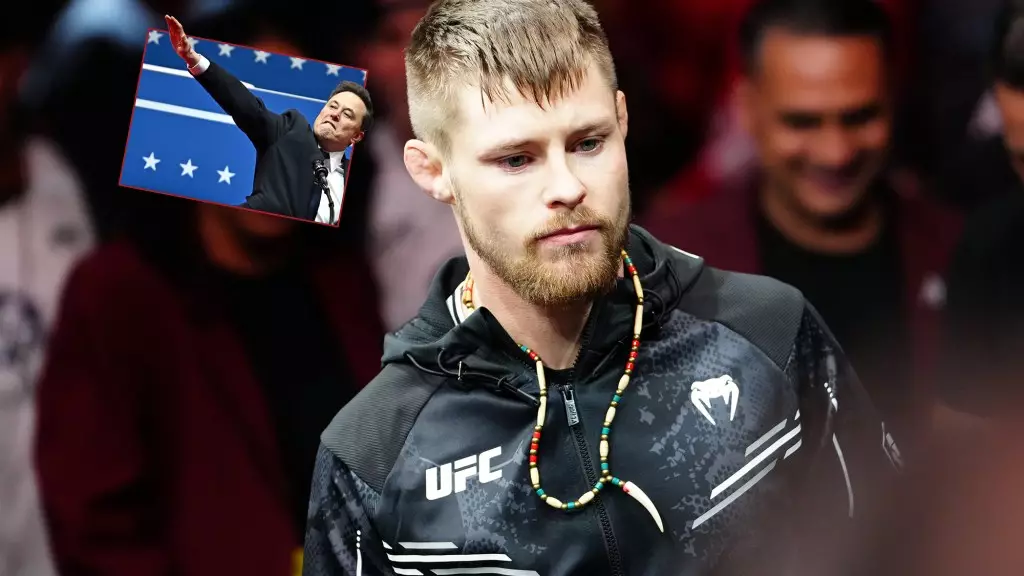In today’s world, professional athletes often step beyond their sporting roles, becoming unwitting spokespersons for a wide range of ideologies, some of which can be deeply disturbing. One notable example is UFC featherweight Bryce Mitchell, who recently made headlines for endorsing highly controversial viewpoints, including praising Adolf Hitler as “a good guy.” Such statements not only reflect a troubling perspective but also illuminate larger societal issues surrounding bigotry, misinformation, and the responsibilities that come with public visibility.
Mitchell’s comments emerged during the inaugural episode of his podcast, “ArkanSanity,” where he addressed recent discussions surrounding controversial figures such as Elon Musk. The original context—Musk’s alleged Nazi salute—quickly transitioned into a harrowing defense of Hitler and antisemitism. During this tirade, Mitchell cursively reflected on Hitler’s actions, justifying his behavior and attempting to characterize him in an unexpectedly benign light. He asserted that before Hitler became involved with drugs, he was merely pursuing the welfare of his nation, which veered dangerously into the territory of historical revisionism.
Critically, it is alarming that such statements could be aired with apparent sincerity, indicating an alarming normalization of hate-filled rhetoric. Mitchell’s assertions demonstrated a willingness to romanticize a figure responsible for widespread atrocity, overshadowing the extensive documentation and testimonies regarding the horrific events of the Holocaust.
The implications of proclaiming the Holocaust as a fabricated narrative cannot be understated. Holocaust denial is not simply an outlandish claim; it represents a rejection of established history and, by extension, the experiences of millions who suffered under Nazi atrocities. By dismissing these historical truths, individuals like Mitchell contribute to a dangerous narrative that seeks to undermine the very fabric of historical memory and the lessons that must be learned from it.
Moreover, endorsing such views in public forums can embolden similar positions among impressionable audiences, particularly younger fans who may idolize sports figures without rigorous scrutiny of their views. This becomes a catalyst for the dispersal of not only antisemitic beliefs but a wider array of intolerant ideologies, which thrive in environments where such perspectives go unchallenged.
The responsibility of public figures extends beyond their performance within their respective sports. They are often seen as role models and have the power to sway public opinion significantly. Consequently, their propagation of harmful beliefs necessitates a response—not only from the institutions that support them but also from the broader community of athletes, fans, and media.
UFC and other sports organizations typically have codes of conduct that outline expected behavior. When individuals breach these protocols through harmful rhetoric, there should be repercussions, whether through disciplinary action or public condemnation. Fostering an environment where inflammatory statements go unchallenged contributes to enabling such ideologies.
Bryce Mitchell’s proclamations serve as a jarring reminder of the persistent undercurrents of bigotry and misinformation pervading modern society. The intersection of sports and social responsibility cannot be overlooked. As spectators, critics, and fellow athletes, it is incumbent upon us to confront such deeply entrenched attitudes with vigor. This entails educating ourselves and others about historical truths and promoting a culture of inclusivity and understanding within and beyond the realms of sports.
The echoes of Mitchell’s opinions should prompt a collective introspection on the influence of public discourse and the necessity of actively opposing hateful ideologies in all their forms. Through such dedication, we can hope to cultivate a future in which the prominent figures in sports reflect ideals of respect, inclusivity, and genuine human dignity rather than casting shadows of hatred and ignorance.

